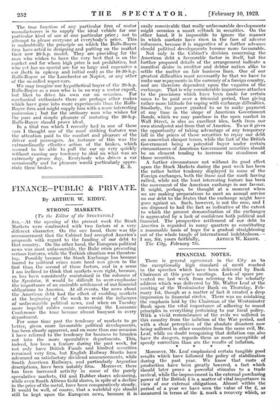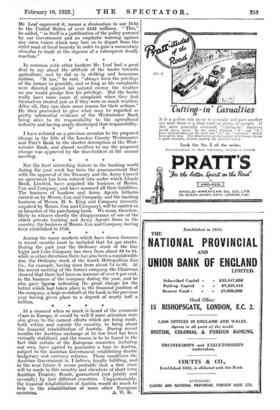FINANCIAL NOTES.
There is general agreement in the City as to the exceptionally high standard of merit reached in the speeches which have been delivered by Bank Chairmen at this year's meetings. Lack of space pre vented me last week from referring to the scholarly address which was delivered by Mr. Walter Leaf at the meeting of the Westininster Bank on Thursday, Feb: ruary 1st, though as a matter of fact it created a deep impression in financial circles. There was no mistaking the emphasis laid by the Chairman of the Westminster Bank upon the vital importance of adhering to sound principles in everything pertaining to our fiscal policy. With a vivid remembrance of the evils we suffered in this country from the inflation of the War period, and with a clear perception of the absolute disasters now being suffered in other countries from the same evil, Mr. Leaf, while no doubt recognizing that deflation can also have its dangers, regards them as more susceptible of speedy correction than are the results of inflation.
Moreover, Mr. Leaf emphasized certain tangible good results which have followed the policy of stabilization during the past year. We know that costs of production have been greatly lowered, a fact which should later prove a powerful stimulus to a trade revival, while the improvement in the external purchasing power of the British £ is a matter of vital importance in view of our external obligations. Almost within the period of a year we have seen the value of the £, • as measured in terms of the $, mark a recovery Which, as- Mr. Leaf expressed it, means a diminution in our Debt to the United States of over £482 millions. " This," he added, " in itself is a justification of the policy pursued by our Government and an emphatic warning against any siren voices which may lure us to depart from the strict road of fiscal honesty in order to gain a momentary stimulus to trade at the expense of a subsequent deadly reaction." * * * * In common with other bankers Mr. Leaf had a good deal to say about the attitude of the banks towards agriculture, and he did so in striking and humorous fashion. "It has," he said, "always been the privilege of the farmer to grumble, and so long as his complaints were directed against his natural enemy the weather no one would grudge him his privilege. But the banks really have some cause of complaint when they find themselves treated just as if they were so much weather. After all, they can show some reason for their actions." He then proceeded to give what may be regarded as pretty substantial evidence of the Westminster Bank being alive to its responsibility to the agricultural industry and having amply discharged that responsibility.
I have referred on a previous occasion to the proposed change in the title of the London County Westminster and Parr's Bank to the shorter description of the West- minster Bank, and almost needless to say the proposed change was approved by the shareholders at the annual meeting. * * * * Not the least interesting feature in the banking world during the past week has been the announcement that with the approval of the Treasury and the Army Council an agreement has been entered into under which Lloyds Bank, Limited, have acquired the business of Messrs. Cox and Company, and have assumed all their liabilities. The business of bankers and Army Agents hitherto carried on by Messrs. Cox and Company, and the banking business of Messrs. H. S. King and Company (recently acquired by Messrs. Cox and Company), will be carried on as branches of the purchasing bank. ire seem, therefore, likely to witness shortly the disappearance of one of the oldest private banking and Army Agents firms in the country, the business of Messrs. Cox and Company having been established in 1758.
* * * Among the many markets which have shown firmness In recent months must be included that for gas stocks. During the past year the Ordinary stock of the Gas Light and Coke Company has risen from about 69 to 94, while in other directions there has also been a considerable rise, the Ordinary stock of the South Metropolitan Gas Co., for example, having risen from about 74 to 95. At the recent meeting of the former company the Chairman showed that there had been an increase of over 8 per cent. In the business of the company during the year, and he also gave figures indicating the great change for the better which had taken place in the financial position of the company, a large overdraft at the bank in the previous year having given place to a deposit of nearly half a million. * * * At a moment when so much is heard of the economic chaos in Europe, it would be well if some attention were also given to the earnest efforts which are being made, both within and outside the country, to bring about the financial rehabilitation of Austria. During recent months the Austrian exchange at its low level has been virtually stabilized, and the reason is to be found in the fact that certain of the European countries, including our own, have agreed to guarantee a loan to Austria, subject to the Austrian Government establishing drastic budgetary and currency reforms. Those conditions the Austrian Government is, I believe, loyally fulfilling, and in the near future it seems probable that a first issue will be made in this country and elsewhere of short term Austrian Treasury Bonds, guaranteed (not jointly and severally) by four different countries. Unquestionably, the financial rehabilitation of Austria would do much to help in the rehabilitation of some other European



































































 Previous page
Previous page